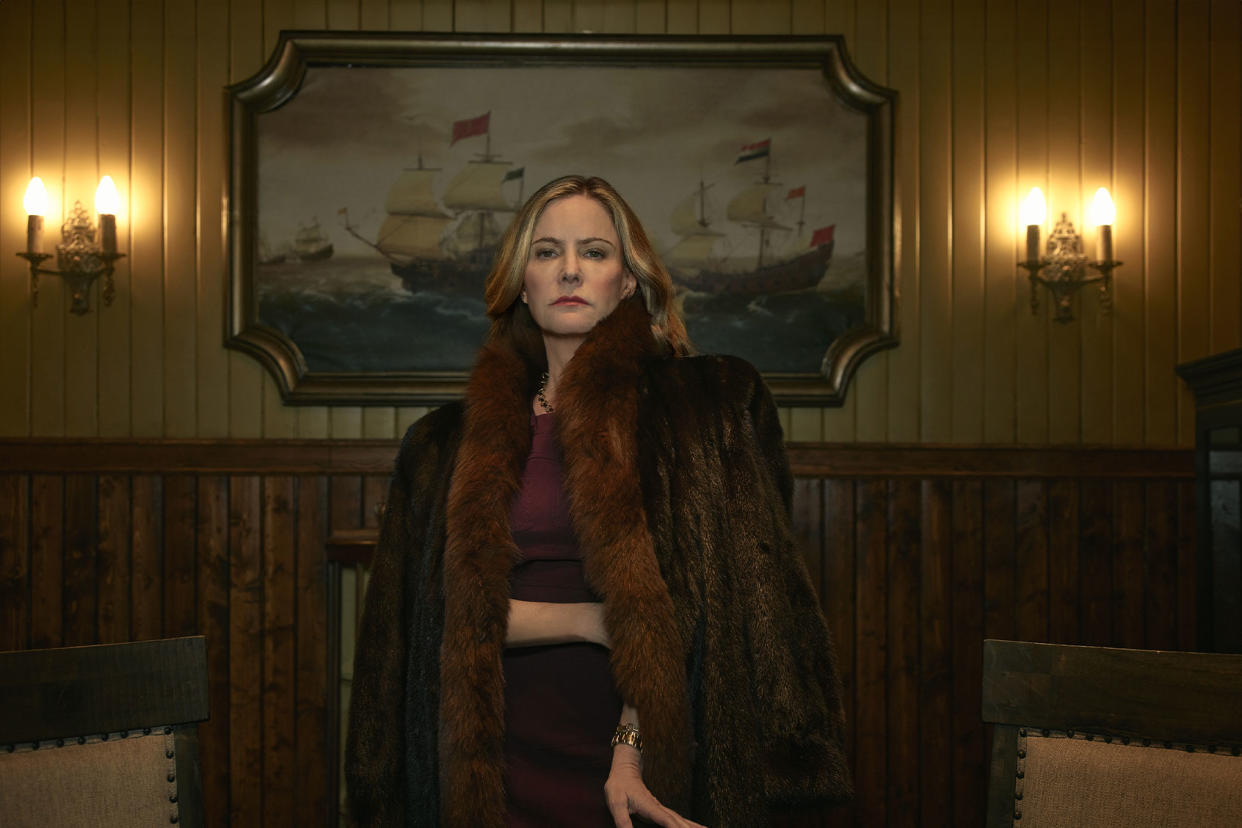Power, respect and conscience: How the women of "Fargo" manage (up) in a man's world

“This is not a story about a woman who made the best of traditional skills . . . This is the ‘woman’s pluck’ story, the dust-bowl story, the burying-your-child-on-the-trail story, the I-will-never-go-hungry-again story, the Mildred Pierce story, the story about how the sheer nerve of even professionally unskilled women can prevail, show the men; the story that has historically encouraged women in this country, even as it has threatened men.”
That prose could be describing Lorraine Lyon, Jennifer Jason Leigh’s indomitable Queen of Debt and the true showstopper of “Fargo.” She seems the type, descending her spiral staircase into our lives (which she’d describe as “sad,” “little” or both) with an imperious purr of “I’m here,” before demanding a do-over when her lawyer on call ruins her entrance.
Lorraine makes the men around her nervous because she has little use for them. For what use are men to a woman with billions in the bank, six governors on speed dial and a personal liaison at the Federal Trade Commission? Her son and husband might as well be pets. She wears her power like a second skin and speaks a mid-Atlantic accent similar to the one Leigh used in “The Hudsucker Proxy,” only mellowed by casks of rare scotch and impatience with unrefined dullards.
Lorraine is not a hero, nor a pure villain, but one of the rarest forces in nature – a woman billionaire who can afford to buy respect or purchase punishments for those who don't show her a healthy fear when she fires a warning shot.
One also gets the sense that Lorraine had to earn a good share of that influence, though. Maybe she was born rich, but not with the type of money she has. Her multibillion-dollar debt consolidation company is cruelly named Redemption Services. Redemption implies salvation or forgiveness, two graces Lorraine lacks for strangers and barely bestows on loved ones. Looming behind her office desk is a behemoth of a painting bellowing what we presume to be her motto: “No.”
By now you may have deduced that the passage quoted above is not about Lorraine. Joan Didion wrote that for The New Yorker about Martha Stewart, although the line that comes next in that paragraph could have easily been written about Lorraine’s Bisquick-mixing daughter-in-law Dorothy (Juno Temple). “The dreams and the fears into which Martha Stewart taps are not of ‘feminine’ domesticity but of female power,” Didion writes, “of the woman who sits down at the table with the men and, still in her apron, walks away with the chips.”
Assuming Lorraine is around the same age as the actor playing her, she would have learned plenty from the example set by Stewart's public rise and fall, and her precarious choice to make her identity and image her brand. Didion’s essay was published four years before Stewart’s pristine if prickly image was undone by her implication in an insider trading scandal, in which she was found guilty of obstructing justice and lying to investigators.
Stewart’s empire was built on elevating the art of homemaking, winning the gratitude and millions of dollars of support from of underappreciated women everywhere. As many have written since, Stewart's main sin was being a successful older woman. She was around 63 when she was sentenced to five months in prison.
Lorraine would have vowed to never go out like Stewart did, making her money by becoming the person who takes the good life for granted instead of toiling to create it.
She barely tolerates Dorothy until trouble comes knocking, threatening her son and her granddaughter, an intentional friction constructed by series creator Noah Hawley. Their rivalry continues the “Fargo” tradition of burdening women with having to constantly fight for every inch of the life they’ve won and the slightest esteem of the men surrounding them.
Lorraine’s battle readiness is the type one learns by competing against men – and it is mostly men in the billionaires’ club – and not only winning but routing them every single time. It’s the arrogance of a woman who never received respect or sympathy and therefore appears to have none to give.

One of the most satisfying subplots of the season involved a sexist pair of bank executives with whom Lorraine sits down, only for them to initially refuse to deal with her until she sets them straight by informing the two that she intends to buy their bank.
Even then, the bank’s top executive fears Jon Hamm’s sheriff Roy Tillman more than Lorraine, because what’s the worst a woman can do? Roy threatens the man to stop him from making the sale to Lorraine, simply because he doesn’t want “that woman” to profit on his territory.
And that makes Scandia police officer Indira Olmstead (Richa Moorjani) braver and more stalwart than she realizes.
When Lorraine first meets Indira, several episodes before she sits down with those good old boys, all she can see is a civil servant in debt up to her eyeballs.
“What is your function?” Lorraine asks Indira when they first meet in her office. “The police. I mean, why do we need you? . . . You’re gatekeepers standing outside the walls, keeping the rabble from getting in. But in here, inside these walls, you have no function. You should remember that.”
Women like Lorraine pride themselves on rarely being surprised, which works in Indira’s favor. She’s also constantly underestimated, leaving her with nothing to push back with except for her anger. So when Lorraine tries to shut her up by saying, “I don’t like your tone,” Indira replies, “Tough s**t. Some of us work for a living and go home to empty houses. Or houses that should be empty bedrooms filled with the dirty underpants of our man-child spouses. Your problem is you think that you're rich because you're better than me.”
Then Indira lists all the ways the two women are alike – more to the point, how alike Lorraine and Dorothy are, despite Lorraine’s dismissive refusal to look at her daughter-in-law’s police file showing the harrowing abuse she survived. In a single conversation Indira moves Lorraine from the conservative “People claiming to be victims are the downfall of this country” to offering Indira the job of heading her security team.
Moments after Indira walks out of Lorraine’s office, Dot’s mother-in-law gets on the phone with that banker who thought denying her was the safer choice. She opens that conversation with, “Are your balls in your belly looking for a safe place to hide? Good.” Mrs. Lyon then opens her devouring maw, listing all the ways she’s arranged to destroy the man’s life. These are not empty words but actions that have already been set in motion. “You want to know what your mistake was? It was thinking death is the worst thing that could happen to you.”
Lorraine’s epic chilliness contributes mightily to the delectability of this season of “Fargo,” offsetting its grim themes of spousal abuse and marriage as a chain of indebtedness. But her relative warming to Indira and Dorothy in the season’s second half makes her more compelling, moving what starts as a pair of adversarial relationships toward a team of women who understand each other, with one offering others a chance to succeed where bureaucracy and lazy men have failed them.
Helpfully we can see some version of this in reality. As Taraji P. Henson spills the details of how poorly treated the cast of “The Color Purple,” she’s returned to mentioning that Oprah Winfrey’s intervention helped her get better pay and other benefits casts of primarily white productions receive, like drivers to the set.
“They [Warner Bros.] gave us rental cars, and I was like, ‘I can’t drive myself to set in Atlanta,’” the Oscar-and Emmy nominee told The New York Times. “This is insurance liability, it’s dangerous. Now they robbing people. What do I look like, taking myself to work by myself in a rental car? So I was like, “Can I get a driver or security to take me?” I’m not asking for the moon. They’re like, ‘Well, if we do it for you, we got to do it for everybody.’ Well, do it for everybody!”
Since Henson first went public with her career-long struggles to get paid what she’s worth and treated with the same respect as her white peers, people have reverted to blaming Winfrey for failing her, playing into the classic tendency to pit high-profile women against each other.
Want a daily wrap-up of all the news and commentary Salon has to offer? Subscribe to our morning newsletter, Crash Course.
But of Winfrey, one of the movie’s main executive producers, Henson posted on her Instagram, “She told me personally to reach out to her for ANYTHING I needed, and I did! It took ONE CALL . . . ONE CONVERSATION . . . and ONE DECISION-MAKING BLACK WOMAN to make me feel heard.”

Who doesn’t love an aspirational power figure and fairy godmother who can make a few calls to reduce your problems if not make them entirely vanish? Hence the satisfaction of witnessing Lorraine’s steady shift from Mommy Dearest to vindictive she-dragon protecting what’s hers, including the two women she views as equals in gladiatorial terms if not financially.
Even so, Lorraine is a dangerous type of savior, playing into our culture’s poisonous trust that oligarchs and corporate titans hailed for their innovations and insufficiently questioned for their wrongdoing. And that may be intentional on the writers’ part, since presenting society as it is and not necessarily as we wish it were is the “Fargo” way.
Indira accepts Lorraine’s offer because it’s better pay than what the Scandia police can offer and a job where with actual power and resources to save Dorothy – another woman who, like her, never asked for a handout and fought for the meager life she wants.
Indira achieves that by hitching her career to someone who benefits from the common person’s suffering, and that should not be lost on us. Neither should the new power she may wield as Lorraine’s new right hand, functioning as the single commodity the Queen of Debt needs but lacks: a conscience.
